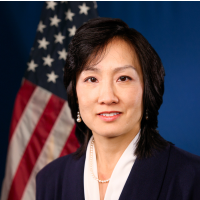Director of the U.S. Patent and Trademark Office: Who Was Michelle Lee?
 Michelle Lee
Michelle Lee
On October 16, 2014, President Barack Obama nominated Michelle K. Lee, an engineer and attorney, to be the head of the U.S. Patent and Trademark Office (USPTO) in the Department of Commerce. Lee was confirmed by the Senate on March 9, 2015, making her the first woman to be USPTO director. Lee was in something of a limbo after Donald Trump was inaugurated as president. It took a Freedom of Information Act request to confirm in March 2017 that she still was in charge of the USPTO. She abruptly resigned her post on June 6, 2017.
Lee, a first-generation Chinese-American, grew up in Saratoga, California, in Silicon Valley, where she has spent most of her life and trained 16 years in classical ballet. Her father was an engineer in the semiconductor industry. Michelle was also interested in electronics—having built a TV set as a child—and went to college at the Massachusetts Institute of Technology (MIT), earning a B.S. in electrical engineering and an M.S in computer science there in 1989. While a student, she did research work at MIT’s Artificial Intelligence Laboratory and at Hewlett-Packard Research Laboratories.
After finishing her thesis early, Lee took some classes at Harvard Law School and became interested in the law. She then went to Stanford Law School because of its reputation in intellectual property law and received her J.D. in 1992 after serving as editor of the Stanford Law Review.
She clerked for federal District Court Judge Vaughn Walker after graduation and worked on the Microsoft-Apple copyright case. The following year, she clerked with appeals court judge Paul Michel.
Lee worked for the firm of Keker & Van Nest from 1994 to 1996 and then moved to the Silicon Valley firm of Fenwick and West, first as an associate and later as a partner. There, she worked primarily with technology companies on issues of licensing, intellectual property, litigation, employment, and corporate matters.
In 2003, Lee went to work for Google as its deputy general counsel and head of patents and patent strategy. She advised the search engine giant on its acquisition of YouTube, participation in the 2009 Nortel patent auction and on mobile phone patent issues.
In July 2005, she co-founded ChIPs, an organization dedicated to helping women in the fields of technology and intellectual property law and regulation.
Lee left for government service in 2012 to head the newly opened Silicon Valley outpost of the USPTO. With that move coming during the government sequester, when funding for new expenditures was difficult to come by, she worked a deal to have the office housed in the same building as the San Jose City Hall.
She was named the USPTO’s deputy director in January 2014 and led the office thereafter. Part of her responsibilities were to put the office back on course after a controversy in which patent examiners were found to have abused telework assignments, engaging in fraud involving the hours they actually worked. However, a 2016 report by the inspector general of the Commerce Department showed that examiners were still being paid for work they hadn’t performed.
The report (pdf) showed that for the nine-month period studied, about $8.8 million was paid out for almost 140,000 hours not worked. For a 15-month period, the study found $18.3 million in billing for almost 300,000 unsupported hours. The report noted that the hours billed for unworked time over that period could have cleared 15,990 backlogged patent cases.
Lee and her husband, Christopher Shen, have one daughter, Amanda.
-Steve Straehley
To Learn More:
The Head of the U.S. Patent Office Has Abruptly Resigned (by Brian Fung, Washington Post)
Patent Office Workers Bilked the Government of Millions by Playing Hooky, Watchdog Finds (by Lisa Rein, Washington Post)
Confirmation Hearing Statement to Senate Judiciary Committee
High Technology Consortia: A Panacea for America’s Technological Competitiveness Problems (by Michelle K. Lee and Mavis K. Lee, Berkeley Technology Law Journal) (pdf)
- Top Stories
- Unusual News
- Where is the Money Going?
- Controversies
- U.S. and the World
- Appointments and Resignations
- Latest News
- Musk and Trump Fire Members of Congress
- Trump Calls for Violent Street Demonstrations Against Himself
- Trump Changes Name of Republican Party
- The 2024 Election By the Numbers
- Bashar al-Assad—The Fall of a Rabid AntiSemite






Comments